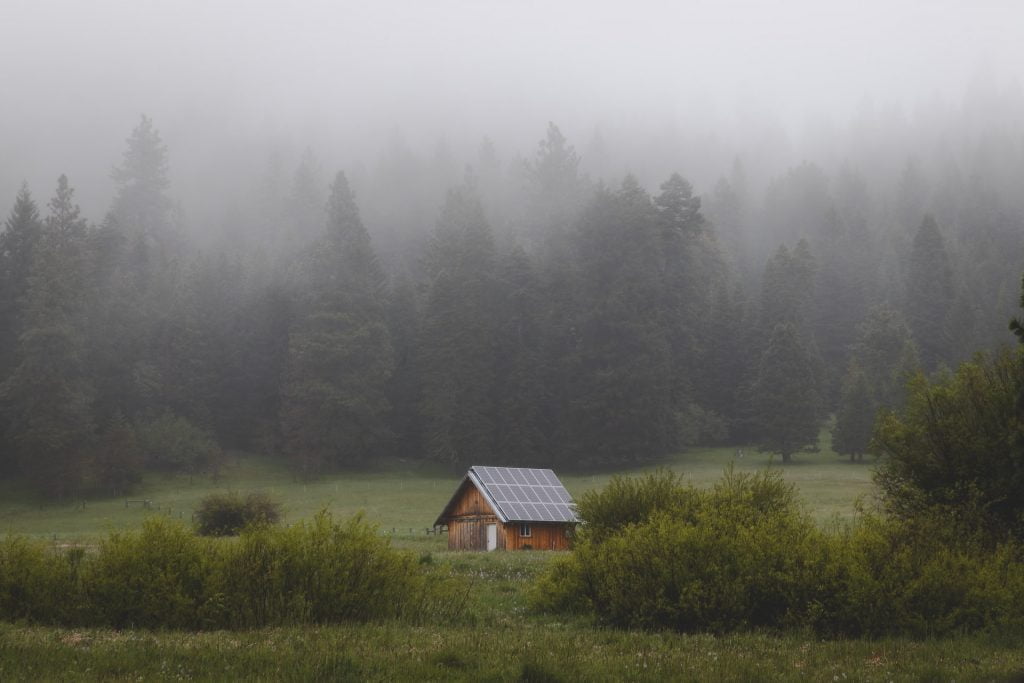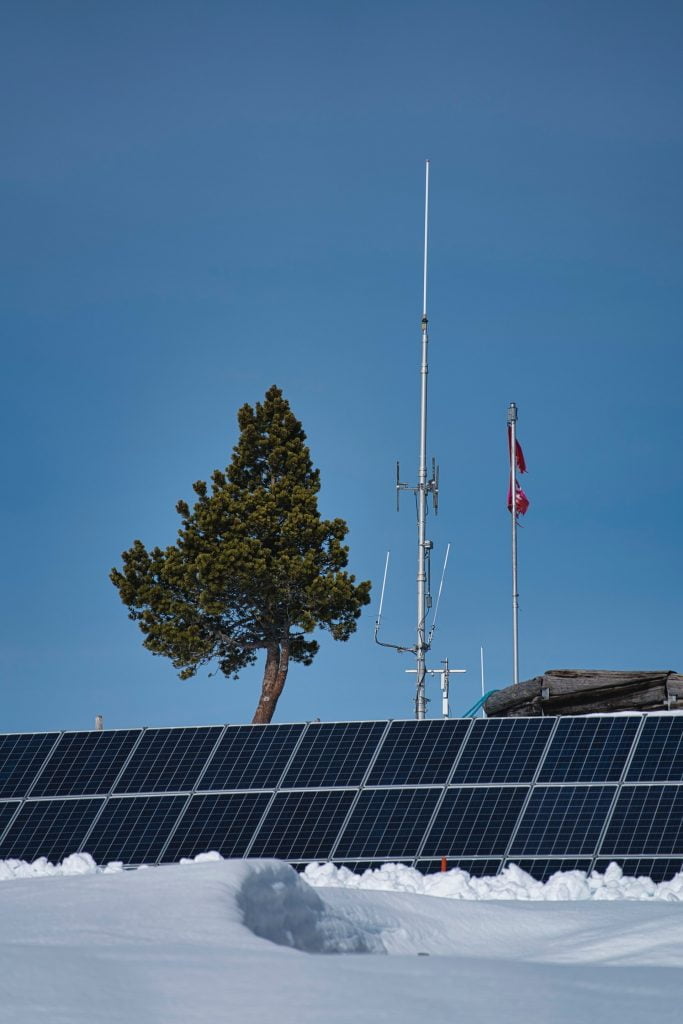Do Solar Panels Work in Winter? It is common to imagine a warm summer climate when considering using a home solar system. However, you can still use a home solar system in the winter. Solar panels can generate just as much solar energy in the winter months as they do in the summer months.
By Rich Murphy
How Do Solar Panels Work?
Solar energy works by channeling energy from the sun and making it into electricity. Solar cells, also known as photovoltaic PV cells, transform the sunlight immediately into electricity. This creates direct current electricity, which travels to an inverter and converts the energy into an alternating current that will be used in your home.
Your solar system production in your home will typically be lower during the winter than in the summer, but the production difference isn’t really as extreme as you might think. Solar panels are not reliant on heat from a sunny day to create electricity. The cold temperatures can even help enhance the solar cells’ production performance. Solar panels rely on sunlight to produce electricity, not warmth. As long as your solar panels are not blocked by any trees or anything causing shade, they will always absorb energy from the sun regardless of the temperature.

How Does Snow Affect Solar Panels?
A well-made residential solar system is supposed to last 25 years or longer. When selecting a rooftop solar system, it is important to remember that premium-grade panels are built to last year-round and combat harsh weather conditions. For example, your solar panels should not be damaged by snow because they are tested to withstand freezing cold temperatures and heavy snowfall.
As long as your solar panels are correctly installed by a certified technician, they are designed to handle harsh weather conditions like heavy snow, lots of rain, and even hail. Your solar panels should outlast major shifts in weather, impact, and corrosion.
Do Solar Panels Work Better with Cold or Warm? Does It Even Matter?
Solar panels work equally the same with cold and warm weather. The temperature of the weather does not matter at all. As long as nothing is blocking the view of the sun from the solar panels, you will be set.
How Much of a Positive Impact Do Solar Panels Have on Our Environment?
There are many benefits of using solar paneling as a source of electricity. The electricity that is produced by solar paneling is clean, emission-free, and renewable. However, most electricity that is generated in the United States is processed by burning fossil fuels such as natural gas and coal. Generating electricity by using renewable resources like hydropower and wind does not cause pollution.
Extracting fossil fuels is not only harmful to our environment, but it is also expensive as well. Solar energy is always readily accessible and it is free. If all of the sun’s energy that shines on our planet for one hour was captured, the entire world could be powered for one whole year!
How Much Does It Cost to Switch to Solar?
The cost of residential solar energy has significantly dropped within the past several years. Ten years ago, the typical six-kilowatt-hour residential system could possibly end up costing you more than $50,000. Today, an average home installation can range from about $15,000 to about $30,000.
Solar panels are spreading over rooftops in America very quickly. Since the cost of solar paneling continues to drop, it isn’t surprising that residential solar systems are installed in the United States every 100 seconds. The cost of residential solar systems is at its lowest in over thirty years.
An average system size with a 4kW capacity costs around $15,000. A large system size with an 8kW capacity can cost about $29,000.

Why Should We Start Using Solar?
The use of solar energy has so many advantages for our environment with offsetting energy costs, reducing the environmental impact of our home, and helping contribute to energy independence.
Eliminate Energy Bills
The use of a residential solar system has the potential to not only reduce your energy bills but eliminate them all together. Even if you live somewhere that tends to be cloudy, solar panels will continue to draw energy from the sun. The more you use energy from your solar panels, the less money you will pay for your bills.
Start Saving from the Beginning
The average annual energy cost per person is a little over $3,000, typically. This includes transportation and residential energy. Using solar power will reduce these costs as soon as they are installed. This offers you long-term savings since it is free to capture energy from the sun.
If you are planning on selling your home in the future, solar panels significantly improve the resale value. Most home buyers are thrilled to buy a home with solar panels, especially since they didn’t have to make the investment to have them installed. Most homeowners will see about a $6,000 resale value increase per kilowatt that is installed. This means that if you have a 3.1-kilowatt system installed, your home’s resale value could be improved by around $18,000.
In addition, solar panels help extend the life of your roof because they protect your roof from rough weather conditions, like heavy snow and rain. They will help make your house more energy efficient in the summer as well, since the heat of the sun is being absorbed by the panels and not hitting your roof directly, the temperature of your home will be lower.
Solar Energy Can Make Use of Underutilized Land
There are vast land areas across the world that are rather far away from big cities and are not close to homes. Since a lot of this land is probably not used for anything at all, it would be great to put the available land to good use. Installing solar panels over these areas would be a great way to make use of our renewable resources.
This is typically known as a solar farm, which is a decentralized solar array that takes energy from the sun and supplies it to the power grid. The main idea of using solar farms is to provide energy for every homeowner, without them having to install solar panels on their own roofs.
Solar Energy Is Non-Contaminating
The use of solar energy does not emit toxic contaminants or substances into the air, which are damaging to the environment and everyone living in it. Toxic substances can corrode buildings and acidify water ecosystems and land. Contaminants in the air can possibly cause heart disease, respiratory diseases (like asthma) and even cancer.

Conclusion: Do Solar Panels Work in Winter?
Using solar paneling as a source of energy is clearly a resourceful alternative to use for electricity in our homes. Solar panels work in the summer and in the winter months and provide you with any benefits for your health and for the environment.
About the Author
Rich Murphy is a Contributing Writer at Persurvive.com. He feels we all should be ready for anything. Whether it’s a personal or natural disaster, his goal is all about educating people how to survive.